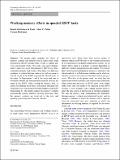Working memory effects in speeded RSVP tasks
Author(s)
Gil-Gómez de Liaño, Beatriz; Rodríguez, Carmen; Potter, Mary C
Download426_2013_Article_479.pdf (397.1Kb)
OPEN_ACCESS_POLICY
Open Access Policy
Creative Commons Attribution-Noncommercial-Share Alike
Terms of use
Metadata
Show full item recordAbstract
The present paper examines the effects of memory contents and memory load in rapid serial visual presentation (RSVP) speeded tasks, trying to explain previous inconsistent results. We used a one target (Experiment 1) and a two-target (Experiment 2) RSVP task with a concurrent memory load of one or four items, in a dual-task paradigm. A relation between material in working memory and the target in the RSVP impaired the identification of the target. In Experiments 3 and 4, the single task was to determine whether any information in memory matched the target in the RSVP, while varying the memory load. A match was detected faster than a non-match, although only when there was some distance between targets in the RSVP (Experiment 4). The results suggest that memory contents automatically capture attention, slowing processing when the memory contents are irrelevant to the task, and speeding processing when they are relevant.
Date issued
2013-02Department
Massachusetts Institute of Technology. Department of Brain and Cognitive SciencesJournal
Psychological Research
Publisher
Springer Berlin Heidelberg
Citation
Gil-Gómez de Liaño, Beatriz, Mary C. Potter, and Carmen Rodríguez. “Working Memory Effects in Speeded RSVP Tasks.” Psychological Research 78.1 (2014): 124–135.
Version: Author's final manuscript
ISSN
0340-0727
1430-2772